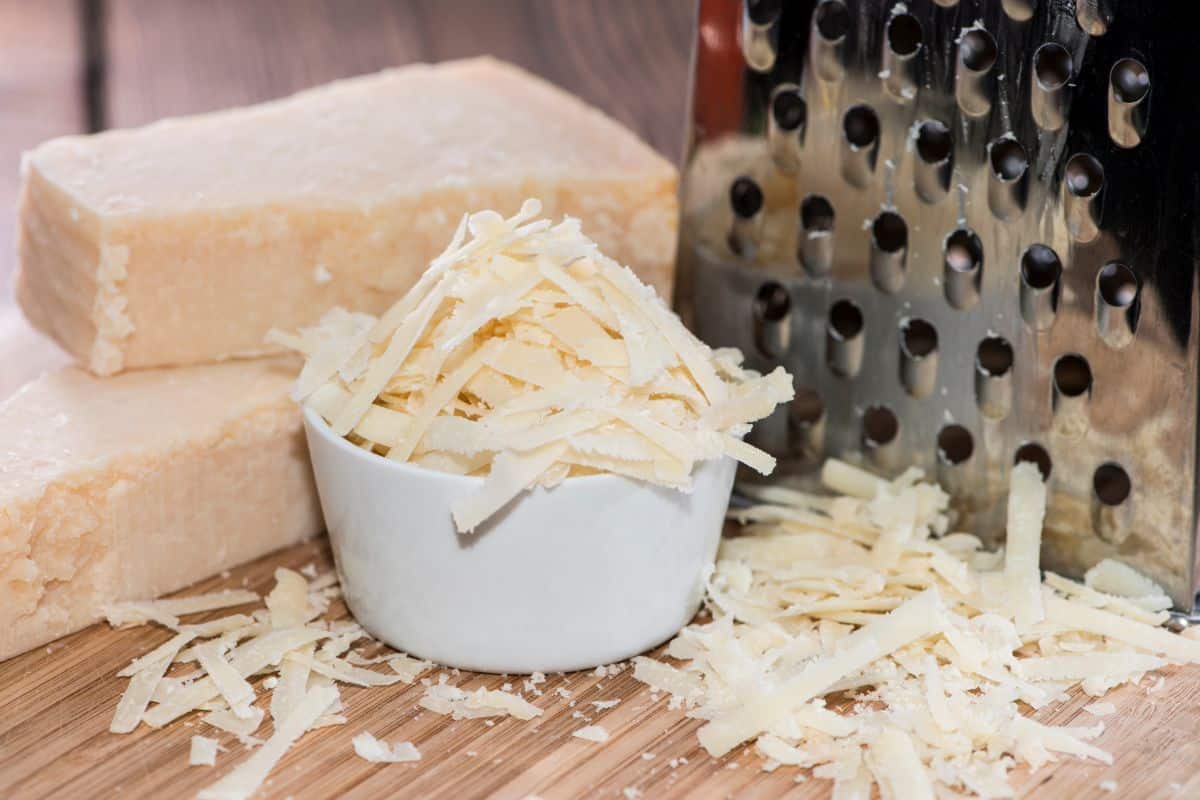Parmesan is as delicious as it is versatile. Whether you decide to add it to your pasta, mash it into your potatoes, or sprinkle it on your pizza, the first step is to make sure it is suitable.

Do you have a block of parmesan cheese in the back of your refrigerator or simply wondering how long it can last, well, you have come to the right place.
While parmesan cheese can expire, it tastes very long for this to happen. Unopened parmesan can last from anywhere between 7 months to an entire year and remain fresh. Once opened, your parmesan will last approximately 3 months before losing its freshness.
That said, it can be safe to consume for much longer. With this in mind, this article will explore everything you need to know about parmesan cheese and its expiration date. Let’s get started.
What Is Parmesan Cheese?
Parmesan cheese is the English translation for Parmigiano-Reggiano in Italian. It is a hard, dry cheese that has a granular texture and a distinctive flavor. This Italian cheese is made using cow’s milk and an aging process that lasts between 12-36 months.
It is often referred to as the “king of cheeses” thanks to its unique profile and high quality. In fact, it is considered a culinary legacy in Italy.
Can Parmesan Cheese Go Bad?
Since parmesan cheese is a hard cheese, it generally has a good shelf life. This is a result of its long curing process that lasts a minimum of 10-12 months. That said, like most cheeses, when not stored properly, it can go bad quickly.
These signs are similar to most cheeses, including mold, slimy texture, and bad smell. If you’re unsure whether or not your cheese has gone bad, then you can simply sniff it. If it smells ammonia-like, then it is best to discard it.
One of the main signs of spoiled parmesan cheese is an off odor. However, a slight sour smell is considered normal. If the smell is overwhelming, then it is a sign the cheese has gone bad.
If you notice mold on your cheese, you can simply cut away 1 inch of the moldy area and check if the rest is safe to eat. When it comes to hard-aged cheese, mold can’t penetrate far. Therefore, it is usually safe to eat the cheese if the mold is only present in one area.
That said, it is always best to use your own judgment. If the mold is too far spread, then it is best to discard the cheese.
It is also important to keep in mind that mold can be found in a range of colors and may be invisible. Therefore, be careful when consuming cheese that features mold.
How To Tell If Your Parmesan Cheese Is Bad?

Before you purchase any parmesan cheese, you’ll want to have a look at the best-by date on the back of the package. The fresher your cheese is, the longer it will last.
Once you notice the cheese drying out and turning a yellow or gray color, it has gone bad and you should discard the cheese. Another obvious sign is green mold.
If your block of parmesan cheese only contains a spot or two of mold, then these can be cut off and are completely safe to eat. If you notice a rancid or sour smell coming from your cheese, this is another indication that your cheese is bad.
When fresh, your cheese should have a strong smell but this shouldn’t smell moldy. This goes the same for taste, too. Your parmesan cheese shouldn’t taste moldy or sour.
If it does then you should discard it immediately – it isn’t worth the risk of becoming unwell. Below, we have outlined the signs your cheese has spoiled with different types of parmesan cheese.
Grated Parmesan Cheese
In addition to hard cheese, you can find parmesan cheese in a grated form which can be more convenient. That said, it does have its pros and cons, too. The pros of purchasing grated parmesan cheese are that you can essentially grab it and start using it straight away.
Whether you’re adding it to your sauce, pasta, or topping it on your pizza. On the other hand, the cons of purchasing grated parmesan are that it doesn’t last nearly as long – or remain as fresh – as freshly grated parmesan cheese from a block.
When it comes to buying grated parmesan cheese, you’ll find its use-by date on the back of the container or the bag. Since best-by and use-by dates are only a recommendation, you can generally get away with using them for a week past their expiration date.
That said, the best way to determine whether or not it is good is by using your senses. As long as you store it in the refrigerator, it can keep for upwards of a month.
Block Of Parmesan Cheese
Block parmesan tends to be the better choice. This is because it stays fresher for longer and tastes delicious when grated directly onto your food. Depending on your preferences, there is a range of cheese graters you can use.
All you have to do is cut off a chunk of cheese and grate however much you want. You can even leave it on the table to allow other people on your table to grate their own cheese – adding as much cheese as they want.
Moreover, block-bought parmesan cheese tends to last longer. This is due to the fact that it has been dehydrated and doesn’t contain much moisture to grow mold – making it last longer.
Make sure to wrap it in foil or saran wrap to prevent any moisture from getting on the cheese and then store it in the refrigerator.
When stored properly in the refrigerator – using the above-mentioned tips – it can last up to 6 weeks. When unopened, it can last approximately 4 months.
Final Thoughts
Parmesan cheese tastes delicious when added to a range of different recipes, including pizza and pasta! For some, it can be considered a staple ingredient. Therefore, having a block of this cheese in your refrigerator isn’t uncommon.
However, what happens when you notice it has gone past its use-by date, does this mean it has gone bad? Well, not necessarily. Before you chuck out your cheese, you should check for signs of mold and rancid odor – otherwise, your cheese should last, unopened, for 6 weeks.






